四种时态及其练习(完整版)
小学四大时态练习(打印版)
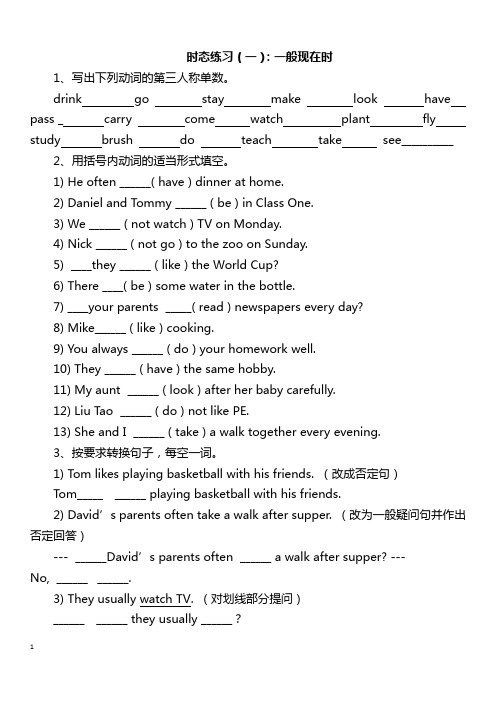
时态练习(一):一般现在时1、写出下列动词的第三人称单数。
drink go stay make look have pass _ carry come watch plant fly study brush do teach take see__________2、用括号内动词的适当形式填空。
1) He often ______( have ) dinner at home.2) Daniel and Tommy ______ ( be ) in Class One.3) We ______ ( not watch ) TV on Monday.4) Nick ______ ( not go ) to the zoo on Sunday.5) ____they ______ ( like ) the World Cup?6) There ____( be ) some water in the bottle.7) ____your parents _____( read ) newspapers every day?8) Mike______ ( like ) cooking.9) You always ______ ( do ) your homework well.10) They ______ ( have ) the same hobby.11) My aunt ______ ( look ) after her baby carefully.12) Liu Tao ______ ( do ) not like PE.13) She and I ______ ( take ) a walk together every evening.3、按要求转换句子,每空一词。
1) Tom likes playing basketball with his friends. (改成否定句)Tom_____ ______ playing basketball with his friends.2) David’s parents often take a walk after supper. (改为一般疑问句并作出否定回答)--- ______David’s parents often ______ a walk after supper? ---No, ______ ______.3) They usually watch TV. (对划线部分提问)______ ______ they usually ______?4)She is always a good student. (改为一般疑问句并作出肯定回答)5)--- ___ ______ always a ______ student? --- ______ , ______ ______ .6)5) Simon and Daniel like going skating. (改为否定句)7)Simon and Daniel ______ ______ going ______.6)Tom does his homework every day.(否定句)Tom_________ ______ his homework every day.7)Alice has got a new comic book as her birthday present.(改为一般疑问句并肯定回答)_________ Alice___________ a new comic book as her birthday presentYes, _______ _________.时态练习(二):一般将来时一、用所给动词的正确形式填空。
小学英语四种时态的区分及练习完整版
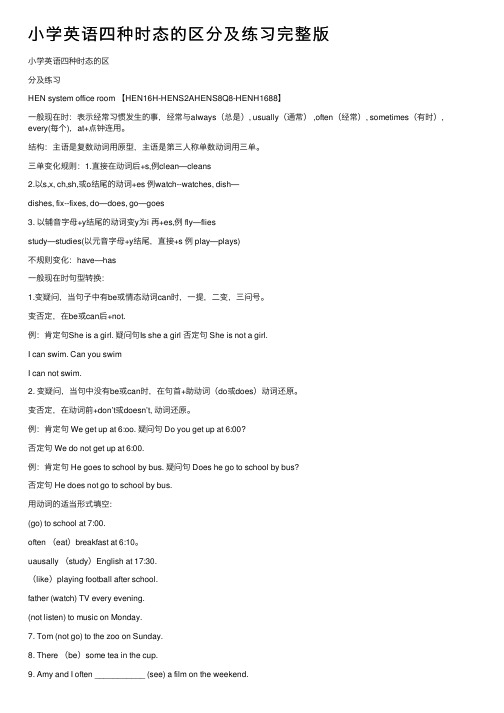
⼩学英语四种时态的区分及练习完整版⼩学英语四种时态的区分及练习HEN system office room 【HEN16H-HENS2AHENS8Q8-HENH1688】⼀般现在时:表⽰经常习惯发⽣的事,经常与always(总是), usually(通常) ,often(经常), sometimes(有时), every(每个),at+点钟连⽤。
结构:主语是复数动词⽤原型,主语是第三⼈称单数动词⽤三单。
三单变化规则:1.直接在动词后+s,例clean—cleans2.以s,x, ch,sh,或o结尾的动词+es 例watch--watches, dish—dishes, fix--fixes, do—does, go—goes3. 以辅⾳字母+y结尾的动词变y为i 再+es,例 fly—fliesstudy—studies(以元⾳字母+y结尾,直接+s 例 play—plays)不规则变化:have—has⼀般现在时句型转换:1.变疑问,当句⼦中有be或情态动词can时,⼀提,⼆变,三问号。
变否定,在be或can后+not.例:肯定句She is a girl. 疑问句Is she a girl 否定句 She is not a girl.I can swim. Can you swimI can not swim.2. 变疑问,当句中没有be或can时,在句⾸+助动词(do或does)动词还原。
变否定,在动词前+don’t或doesn’t, 动词还原。
例:肯定句 We get up at 6:oo. 疑问句 Do you get up at 6:00?否定句 We do not get up at 6:00.例:肯定句 He goes to school by bus. 疑问句 Does he go to school by bus?否定句 He does not go to school by bus.⽤动词的适当形式填空:(go) to school at 7:00.often (eat)breakfast at 6:10。
小升初英语四大时态复习讲解及真题专项练习含答案
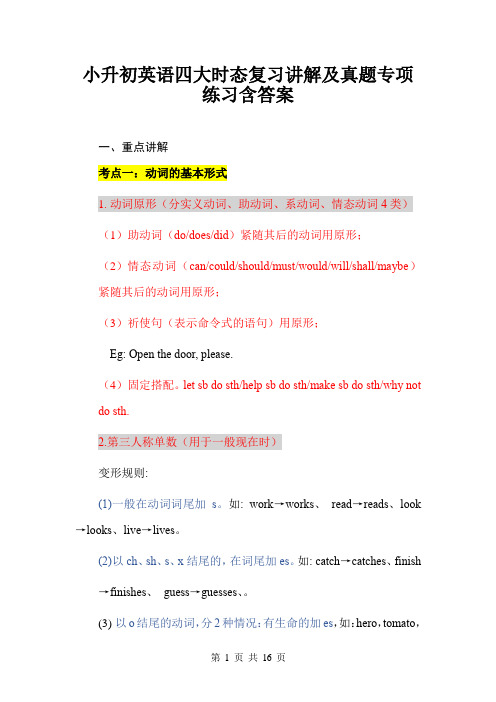
小升初英语四大时态复习讲解及真题专项练习含答案一、重点讲解考点一:动词的基本形式1.动词原形(分实义动词、助动词、系动词、情态动词4类)(1)助动词(do/does/did)紧随其后的动词用原形;(2)情态动词(can/could/should/must/would/will/shall/maybe)紧随其后的动词用原形;(3)祈使句(表示命令式的语句)用原形;Eg: Open the door, please.(4)固定搭配。
let sb do sth/help sb do sth/make sb do sth/why not do sth.2.第三人称单数(用于一般现在时)变形规则:(1)一般在动词词尾加s。
如: work→works、read→reads、look →looks、live→lives。
(2)以ch、sh、s、x结尾的,在词尾加es。
如: catch→catches、finish→finishes、guess→guesses、。
(3)以o结尾的动词,分2种情况:有生命的加es,如:hero,tomato,potato;没有生命的加s,如:radio,photo。
(4)以辅音字母加y结尾的动词,变y为ies。
如: fly→flies、study →studies、carry→carries.(5) 不规则变化。
如: have→has ,are→is,were→was3.现在分词(用于现在进行时)变形规则:(1)一般在动词后加ing。
如: work→working、read→reading、look →looking、wait→waiting。
(2)以不发音的e结尾的动词,去掉e,再加ing。
如: smile→smiling、move→moving、take→taking、write→writing。
(3)以重读闭音节结尾的且词尾只有一个辅音字母的,双写这个辅音字母加ing。
如: sit→sitting、stop→stopping、cut→cutting、run →running、swim→swimming.(4)少数几个以ie结尾的动词,将ie改为y加ing。
(完整版)小学英语四种时态练习题丁晓彤
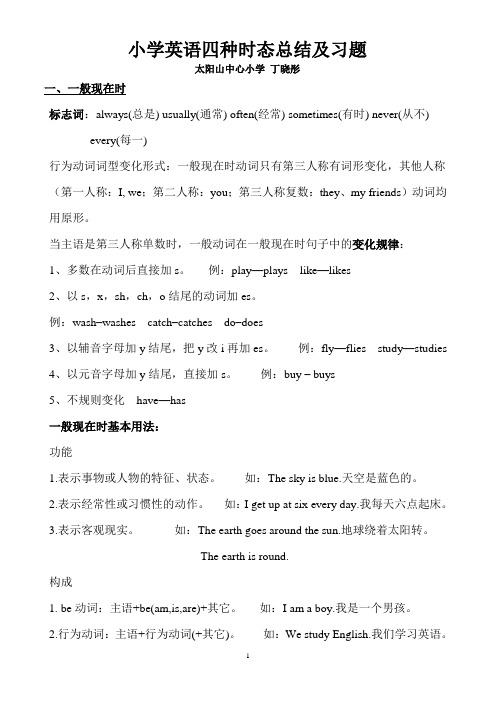
小学英语四种时态总结及习题太阳山中心小学丁晓彤一、一般现在时标志词:always(总是) usually(通常) often(经常) sometimes(有时) never(从不) every(每一)行为动词词型变化形式:一般现在时动词只有第三人称有词形变化,其他人称(第一人称:I, we;第二人称:you;第三人称复数:they、my friends)动词均用原形。
当主语是第三人称单数时,一般动词在一般现在时句子中的变化规律:1、多数在动词后直接加s。
例:play—plays like—likes2、以s,x,sh,ch,o结尾的动词加es。
例:wash–washes catch–catches do–does3、以辅音字母加y结尾,把y改i再加es。
例:fly—flies study—studies4、以元音字母加y结尾,直接加s。
例:buy – buys5、不规则变化have—has一般现在时基本用法:功能1.表示事物或人物的特征、状态。
如:The sky is blue.天空是蓝色的。
2.表示经常性或习惯性的动作。
如:I get up at six every day.我每天六点起床。
3.表示客观现实。
如:The earth goes around the sun.地球绕着太阳转。
The earth is round.构成1. be动词:主语+be(am,is,are)+其它。
如:I am a boy.我是一个男孩。
2.行为动词:主语+行为动词(+其它)。
如:We study English.我们学习英语。
句型肯定句:A. be动词:主语+ be + 其它成分如:He is a worker.B.行为动词:主语+动词(注意人称变化) +其它成分如:We like the little cat.否定句:A. be动词:主语+ be + not +其它成分如:They are not students.B.行为动词:主语+助动词(do/does) + not +动词原形+其它成分如:We don’t like the little cat.一般疑问句:A. be动词:Am / Is /Are +主语+ 其它成分如:Are you a teacher? Yes, I am. / No, I am not.Are they students of your school?Yes they are / No they aren’t.B.行为动词:助动词(Do/Does)+主语+动词原形+ 其它成分如:Do you like it? Yes, I do. / No. I don’t .Does he(she) like it? Yes, he( she )does. / No, he ( s he )doesn’t.特殊疑问句:疑问词+ 一般疑问句A. be动词:How many students are there in your school?B.行为动词:What do you usually do on Sunday?一般现在时动词be和have的变化形式1.动词Be 用法:第一人称单数用am,第三人称单数用is,其它人称用are。
四种时态练习及答案
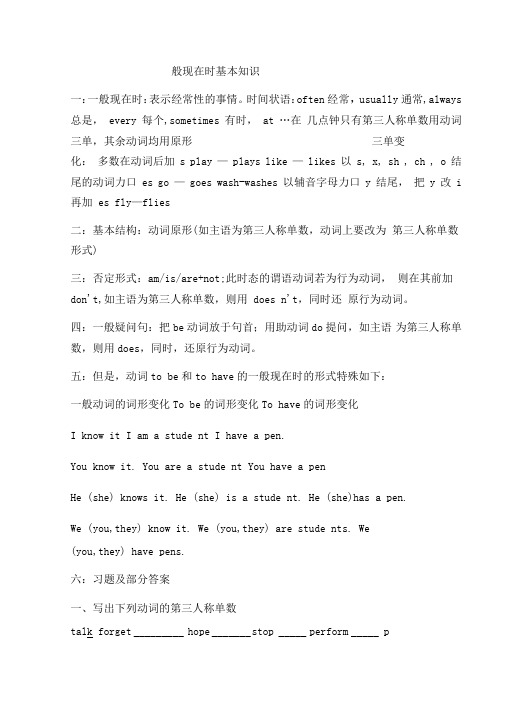
般现在时基本知识一:一般现在时:表示经常性的事情。
时间状语:often经常,usually 通常,always 总是, every 每个,sometimes 有时, at …在几点钟只有第三人称单数用动词三单,其余动词均用原形三单变化:多数在动词后加 s play — plays like — likes 以 s, x, sh , ch , o 结尾的动词力口 es go — goes wash-washes 以辅音字母力口 y 结尾,把 y 改 i 再加 es fly—flies二:基本结构:动词原形(如主语为第三人称单数,动词上要改为第三人称单数形式)三:否定形式:am/is/are+not;此时态的谓语动词若为行为动词,则在其前加don't,如主语为第三人称单数,则用 does n't,同时还原行为动词。
四:一般疑问句:把be动词放于句首;用助动词do提问,如主语为第三人称单数,则用does,同时,还原行为动词。
五:但是,动词to be和to have的一般现在时的形式特殊如下:一般动词的词形变化To be的词形变化To have的词形变化I know it I am a stude nt I have a pen.You know it. You are a stude nt You have a penHe (she) knows it. He (she) is a stude nt. He (she)has a pen.We (you,they) know it. We (you,they) are stude nts. We(you,they) have pens.六:习题及部分答案一、写出下列动词的第三人称单数talk forget _________ hope _______ s top _____ perform _____ play ______ s ay ______buy ______ w orry _____ fly _____ study _______ like ______ m ake _____take ______love ______ recite ______ become ________ come _______ drive ______shine _______leave ____ w ake ________ r ide ______ write ______ hike _____ give ___see ______ s wim ______ stop ______ s hop_______ plan ______ g et ______sit ______ l et ______cut _______ run ______ forget ______ begin ______ wash _____ watch_finish ____ teach ____ fish _______ r each _______ go ______ do _____ 二、用括号动词的适当形式填空。
四种时态及其练习(完整版)
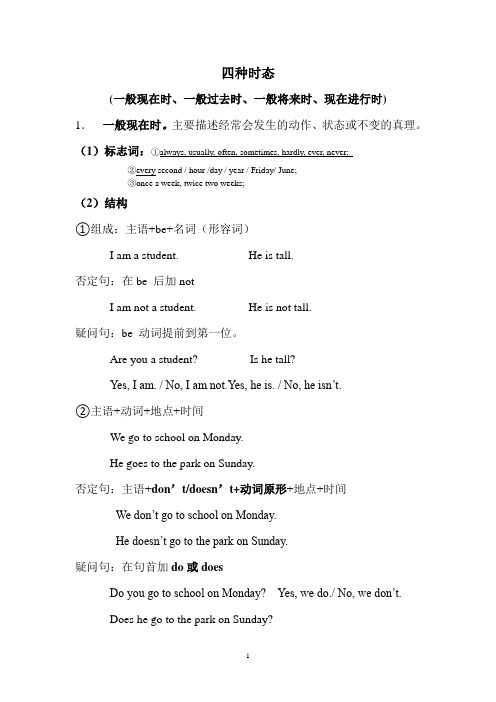
四种时态(一般现在时、一般过去时、一般将来时、现在进行时)1.一般现在时。
主要描述经常会发生的动作、状态或不变的真理。
(1)标志词:①always, usually, often, sometimes, hardly, ever, never;②every second / hour /day / year / Friday/ June;③once a week, twice two weeks;(2)结构①组成:主语+be+名词(形容词)I am a student. He is tall.否定句:在be 后加notI am not a student. He is not tall.疑问句:be 动词提前到第一位。
Are you a student? Is he tall?Yes, I am. / No, I am not.Yes, he is. / No, he isn’t.②主语+动词+地点+时间We go to school on Monday.He goes to the park on Sunday.否定句:主语+don’t/doesn’t+动词原形+地点+时间We don’t go to school on Monday.He doesn’t go to the park on Sunday.疑问句:在句首加do或doesDo you go to school on Monday? Yes, we do./ No, we don’t.Does he go to the park on Sunday?Yes, he does./ No, he doesn’t.(3)动词三单变化:①在原单词末尾加s , 如:like –likes②单词以o, sh, ch, s, x 结尾加es, 如:go –goes③单词末尾为辅音+y结尾去y加ies 如:study- studies2. 现在进行时:主要叙述正在发生的事情。
小学英语四种时态__谢
4.There
are (be)four seasons in(be) a tall girl. is 6.I
go (go)shopping once a week.
现在进行时(Present Progressive)
概念: 表示现在正在发生的动作h 或存在的状态 结构: be (is, am, are) + doing
小学英语动词的时态练习
(
)6. Did your father his friend on the 5th of October? A. called B. call C. is calling )7. Where A. was you last night? B. are C. were
4. 特殊疑问句
特殊疑问词+一般疑问句+? What is your father? 你爸爸是干什么的? What do you do every day? 你每天做些什么? When does your mother go to work every day? 你妈妈每天什么时候去上班?
(完整版)小学六年级英语四大时态总复习练习
小学英语四种时态复习一提到时态,就必定用到动词。
第一要明确两个观点:动词有五种形式,即:原形(形式),第三人称单数(形式),过去式(形式),此刻分词(形式),过去分词(形式)。
小学阶段,句子有以下四种常有时态,即:一般此刻时态;一般过去时态;一般未来时态;此刻进行时态。
式,意思就是各样不一样的形式,是对应着动词来说的;时态,意思就是表达各样不一样的时间的事情,是对应着句子来说的。
式与时,先搞懂差别。
一、一般此刻时态一般此刻时用法口诀一般此刻时, every, usually, often, sometimes.第一、二人称和复数,动词原形不变换。
除了 I, you,复数外,动词后加s(es)别忘却。
要变一般疑问句, be 动词提早很简单。
假如没有 be动词, Do 和 Does 开头要注意。
否认句,很简单, not 在 be 动词后边站。
假如没有 be 动词, do, does加 not 要切记。
请把这些规律记,一般此刻时没问题。
一般此刻时态,可能是两种意思。
第一,表示常常性的动作,常与 often, sometimes, usually, every day, every week,every month, every year等表示频次的副词连用。
比如:He often goes swimming in summer.I usually go to work by bike.Sam visits China every year.第二,表示此刻的状态。
如: My mother is a worker.There is a computer in our classroom.注意问题:be (am, is, are)动词就是独立的谓语动词,一个句子中有了be(am, is, are)就有了谓语动词了。
句子中不可以同时出现两个谓语动词。
许多同学常常出这样的错误:The boy is often eats hamburgers(.错)应改为: The boy often eats hamburgers.二、此刻进行时态正在进行时态口诀此刻分词用途多,进行时态不用说。
word完整版小升初四大时态及习题
.英语四大时态总复习一般现在时一、一般现在时的形式以及定义二、一般现在时的基本用法1. 表示事物的性质、特征以及经常性的行为,常与always, often, usually, every day等词连用。
Tom usually comes to school late. Tom 经常上学迟到。
2. 表示客观事实和普遍真理。
The sun rises in the east. 太阳从东方升起。
3. 用在格言、谚语中。
No pains, no gains.不劳而获。
一般过去时一、一般过去时的定义以及形式..二、一般过去时的基本用法与常态,存作或在的状间表示在过去的时里发生的动1.等连用。
yesterday, last night, several years ago I took a bus to school last Friday.上周五我坐公交车去上学。
2. 表示在过去的某段时间里,经常或反复发生的动作或状态。
他们去年经常晚饭They had a walk after supper last year.后散步。
一般将来时一、一般将来时的定语以及形式二、一般将来时的基本用法常与将来的时间状语1. 表示将来某个时间要发生的动作或状态,tomorrow, next week等连用。
..She will be back tomorrow.她明天就回来。
2. 表示将来某一时间内经常发生的动作或状态。
We'll have a test every Monday this year. 今年的每一个周一我们都有考试。
巧学妙计Be going to 指当前已计划过或思考过的意图和打算;will/shall 表示未事先思考或未计划的意图。
Be going to 还可以表明马上要发生,而will则表明说话者的观点、主观意识。
I'm going to visit mu aunt this week. 我打算这周去看望姑姑。
小学四种时态试题及答案
小学四种时态试题及答案一、一般现在时1. 我每天上学。
A. go to schoolB. goes to schoolC. am going to schoolD. am going to go to school答案:A2. 他经常帮助别人。
A. He often help others.B. He often helps others.C. He often helped others.D. He often helping others.答案:B3. 我们喜欢游泳。
A. We like to swim.B. We likes to swim.C. We liked to swim.D. We liking to swim.答案:A二、一般过去时4. 昨天我去了图书馆。
A. I go to the library yesterday.B. I went to the library yesterday.C. I am going to the library yesterday.D. I go to the library yesterday.答案:B5. 他们上周看了电影。
A. They watch a movie last week.B. They watched a movie last week.C. They are watching a movie last week.D. They will watch a movie last week.答案:B6. 她昨天买了一本书。
A. She buy a book yesterday.B. She bought a book yesterday.C. She is buying a book yesterday.D. She will buy a book yesterday.答案:B三、一般将来时7. 明天我要去看医生。
A. I am going to see a doctor tomorrow.B. I go to see a doctor tomorrow.C. I went to see a doctor tomorrow.D. I will go to see a doctor tomorrow.答案:A8. 他们将要参加比赛。
- 1、下载文档前请自行甄别文档内容的完整性,平台不提供额外的编辑、内容补充、找答案等附加服务。
- 2、"仅部分预览"的文档,不可在线预览部分如存在完整性等问题,可反馈申请退款(可完整预览的文档不适用该条件!)。
- 3、如文档侵犯您的权益,请联系客服反馈,我们会尽快为您处理(人工客服工作时间:9:00-18:30)。
四种时态(一般现在时、一般过去时、一般将来时、现在进行时)1.一般现在时。
主要描述经常会发生的动作、状态或不变的真理。
(1)标志词:①always, usually, often, sometimes, hardly, ever, never;②every second / hour /day / year / Friday/ June;③once a week, twice two weeks;(2)结构①组成:主语+be+名词(形容词)I am a student. He is tall.否定句:在be 后加notI am not a student. He is not tall.疑问句:be 动词提前到第一位。
Are you a student? Is he tall?Yes, I am. / No, I am not.Yes, he is. / No, he isn’t.②主语+动词+地点+时间We go to school on Monday.He goes to the park on Sunday.否定句:主语+don’t/doesn’t+动词原形+地点+时间We don’t go to school on Monday.He doesn’t go to the park on Sunday.疑问句:在句首加do或doesDo you go to school on Monday? Yes, we do./ No, we don’t.Does he go to the park on Sunday?Yes, he does./ No, he doesn’t.(3)动词三单变化:①在原单词末尾加s , 如:like –likes②单词以o, sh, ch, s, x 结尾加es, 如:go –goes③单词末尾为辅音+y结尾去y加ies 如:study- studies2. 现在进行时:主要叙述正在发生的事情。
(1)标志词:①now,right now,②at present,at the moment, at this time,③these days④ Look! ,Listen! ⑤....o’clock(2)结构组成:主语+be +动词ing形式I am reading English.They are swimming.He is playing football.否定句:在be后加notI am not reading English.They are not swimming.He is not playing football.疑问句:将be 放到第一位。
Are you reading English? Yes, I am./ No, I am not.Are they swimming? Yes, they are. / No, they aren’t. Is he playing football? Yes, he is. / No, he isn’t.(3)动词变ing形式:①在动词末尾加ing. 如:play- playing②末尾有e 要去e加ing. 如:ride –riding③末尾以辅音元音辅音结尾双写末尾一个辅音如:swim-swimming3.一般将来时。
主要描述将来要发生的事情。
(1)标志词:①tomorrow,the day after tomorrow,the year after next year,tomorrow morning/afternoon /evening②next week/year/term/summer vacation/Friday③from now on; in the future;in 2050;④in + 时间段(重点)(2)结构①组成:主语+be going to +动词原形I am going to visit Ann.They are going to draw a dog.She is going to ride a horse.否定句:在be后加notI am not going to visit Ann.They are not going to draw a dog.She is going to ride a horse.疑问句:将be提前Are you going to visit Ann? Yes, I am. / No, I am not.Are they going to draw a dog? Yes, they are./ No, they aren’t.Is she going to ride a horse? Yes, she is. / No, she isn’t.②组成:主语+will+动词原形I will go to the library.They will clean the house.She will eat breakfast at home.否定句:在will 后加not 或将will not 写为won’tI will not go to the library.They will not clean the house.She will mot eat breakfast at home.疑问句:将will 提前Will you go to the library? Yes, I will./ No, I won’t.Will they clean the house? Yes, they will. / No, they won’t.Will she eat breakfast at home? Yes, she will. /No, she won’t. 4.一般过去时:主要描述过去发生的事情.(1)标志词:①yesterday, yesterday morning/afternoon,the day before yesterday,②before,the year before last year,③in 1845/in the 1840s④last year/month/week/term/Sunday/summer⑤just now; the other day⑥时间段+ago; long long ago(2)结构组成:主语+动词过去式I was a pilot.They were busy.He went to the market. 否定句:在be后加not 在普通动词前加didn’t 动词恢复原形。
I was not a pilot.They were not busy.He didn’t go to the market.疑问句:提前be 动词或在句前加didWere you a pilot? Yes, I was./ No, I wasn’t.Were they busy? Yes, they we re./ No, they weren’t.Did they go to the market? Yes, they did. / No, they didn’t.(4)动词变过去式:①在原次末尾加ed 或d 如:play-played like-liked②辅音加y 结尾去y加ied 如:study-studied③辅音元音辅音结尾双写最后一个字母加ed 如:stop-stopped④特殊变化:can-could do-did eat-ate go-went hit-hitpit-put sit-sat come-came get-got have-had see-saw begin-began give-gave win-won read-read am/is-was are-were run-ran hear-heard hide-hid lay-laid cut-cut wake-woke fall-fell()1. Who ______ over there now?A. singingB. are singC. is singingD.sings()2. It’s nine ten. The students ______ a music class.A. haveB. havingC. are havingD.has()3. Listen! The boy _______.A. cryingB. is cryingC. criesD.are crying()4. Don’t talk here. Grandparents ______.A. sleepB. is sleepingC. are sleepingD.am sleeping()5. Is the man _______ tea or milk?A. drinksB. drinkC. drinkingD.drinkking()6. The Greens _____ supper now.A. is havingB. are havingC. hasD.have()7. Look!Mary ____ doing _____ homework.A. is,one’sB. is,herC. are,hisD.are,her()8. The children are ______ TV.A. watchB. seeingC. watchingD.reading()9. Polly ______ a banana now.A. isn’t eatingB. aren’t eatingC. are eatingD.eats()10. Where _____ they ________?A.is,standingB.are,standingC. are,standD.am,standing()11. There _____ an English film at the cinema now.A. will haveB. is going to haveC. is going to beD. is()12. The picture _______ nice.A. looksB. is lookedC. lookD. is looking()13. She ______ down and soon falls asleep.A. liveB. lainC. laidD. sits()14. They _____ the office in time very morning.A. reach toB. arrivedC. wentD. get to()15. We shall go to Shanghai on business before you _____ back next week.A. will comeB. cameC. would comeD. come()16. The plane ______ over there.A. isB. areC.amD. was()17. I see her ____ the room this morning.A. to enterB. enteredC. enterD. enters()18. The teacher ________us to come to school on time.A. askB. askingC. asksD.asked()19. John always ______ others.A. helpB. helpingC. helpsD.to help()20. He ______for eight hours every day.A. workingB. to workC. worksD. worked( )1. There __________ a meeting tomorrow afternoon.A.will be going toB. will going to beB. is going to be D. will go to be( )2. Charlie ________ here next month.A.isn’t workingB. doesn’t workingC. isn’t going to workingD. won’t work( )3. He ________ very busy this week, he ________ free next week. A. will be; is B. is; isD. will be; will be D. is; will be( )4. There ________ a dolphin show in the zoo tomorrow evening.A. wasB. is going to haveC. will haveD. is going to be ( )5. –________ you ________ free tomorrow?– No. I ________ free the day after tomorrow.A. Are; going to; willB. Are; going to be; willC. Are; going to; will beD. Are; going to be; will be( )6. Mother ________ me a nice present on my next birthday.A. will givesB. will giveC. givesD. give( )7. – Where is the morning paper?– I ________ it for you at once. \A. getB. am gettingC. to getD. will get( )8. ________ a concert next Saturday?A. There will beB. Will there beC. There can beD. There are ( )9. If they come, we ________ a meeting.A. haveB. will haveC. hadD. would have ( )10. What _____they _____dinner yesterday ?A. do; have forB. did; had forC. did; have forD. were; have for ( )11. Could you tell me what time the plane ?A. leftB. leavesC. leavedD. was leaving ( )12. One of us ______band last month.A. leavesB. leaveC. leavedD. left( )13. Where _______your mother born?A. areB. wasC. wereD. is( )14. Do you know why he_____for class last year?A.was always lateB. always was lateC. is late alwaysD. is always late ( )15. I got up _____this morning, so I _____breakfast and went to school.A. late; didn’t haveB. early; didn’t haveC. late; hadn’tD. early; hadn’t( )16. It ______much cold today than it _____ yesterday.A.is; isB. was; wasC. is; wasD. was; is ( )17. He didn’t come_____goodbye to us and away.A. say; goB. say; wentC. to say; wentD. to say ; go ( )18. Her pen was broken. She____ to _____a new one.A.wants; buysB. wanted; boughtC. wants; boughtD. wanted; buy ( )19. I thought the dress_____ really pretty.A.isB. wasC. /D. were ( )20. He said he ______go to cook dinner for us.A. willB. wouldC. /D. doesn’t。
